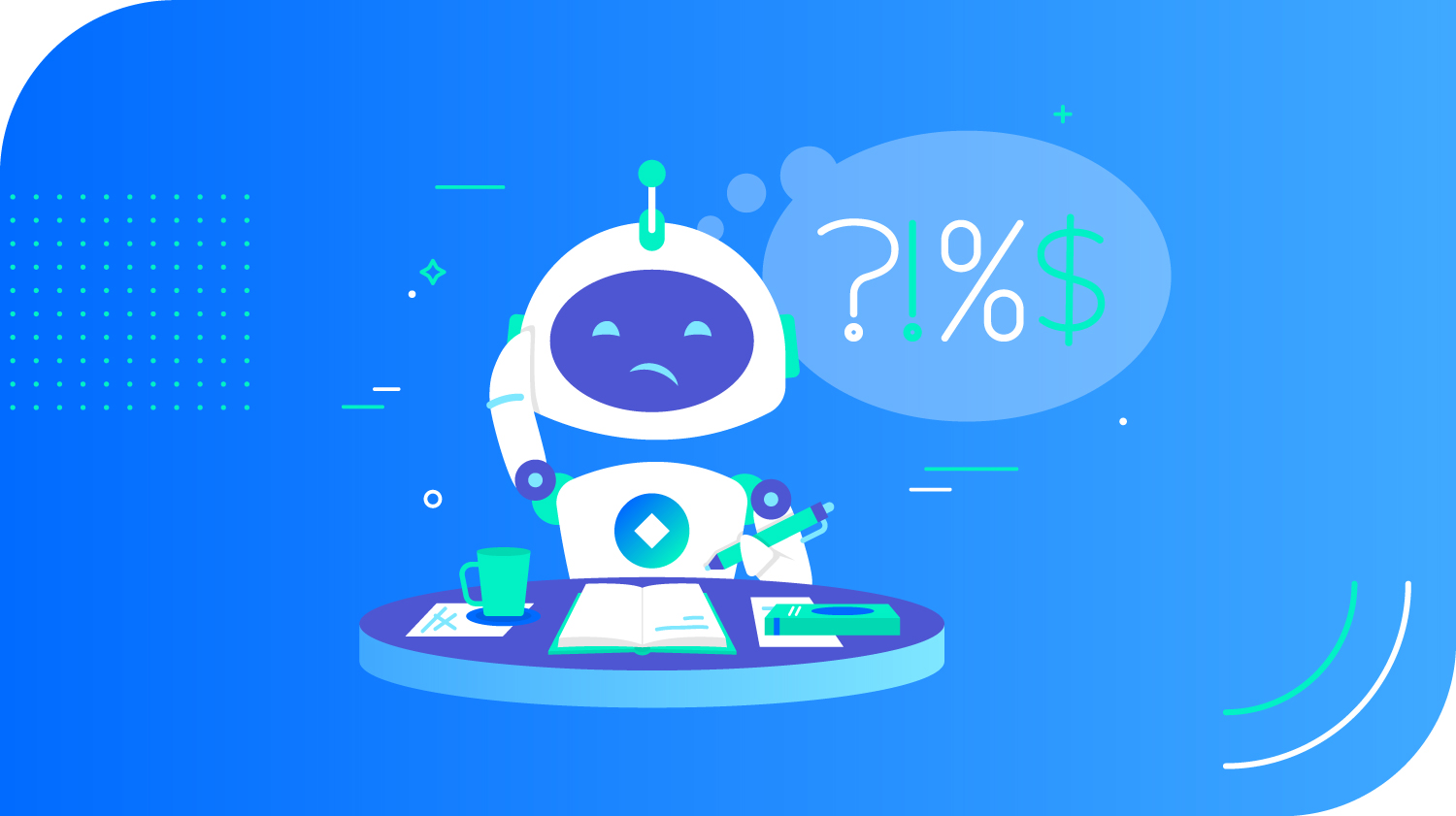Are you an avid bookworm?
Then you’ll no doubt recognize this very famous opening paragraph:
“Mr. and Mrs. Dursley of number four, Privet Drive, were proud to say that they were perfectly normal, thank you very much. They had been especially proud to say it when one of their friends, Mrs. Figg of number twelve, had persuaded them to go to a special party at the Leaky Cauldron. It had to do with the Hogwarts Express, of course, and Harry Potter. He was a magical boy, and all that was normal about him was his love for the girl who lived across the street from him.”
The first line is familiar to all the Potterheads out there.
…But what happened to the rest of the paragraph?
That was a slight twist in the tale written entirely by our AI writing software, HyperWrite. 😉
Over 80% of Americans would like to be an author. Guess what? You can accomplish that dream a little easier with the help of AI book writing software.
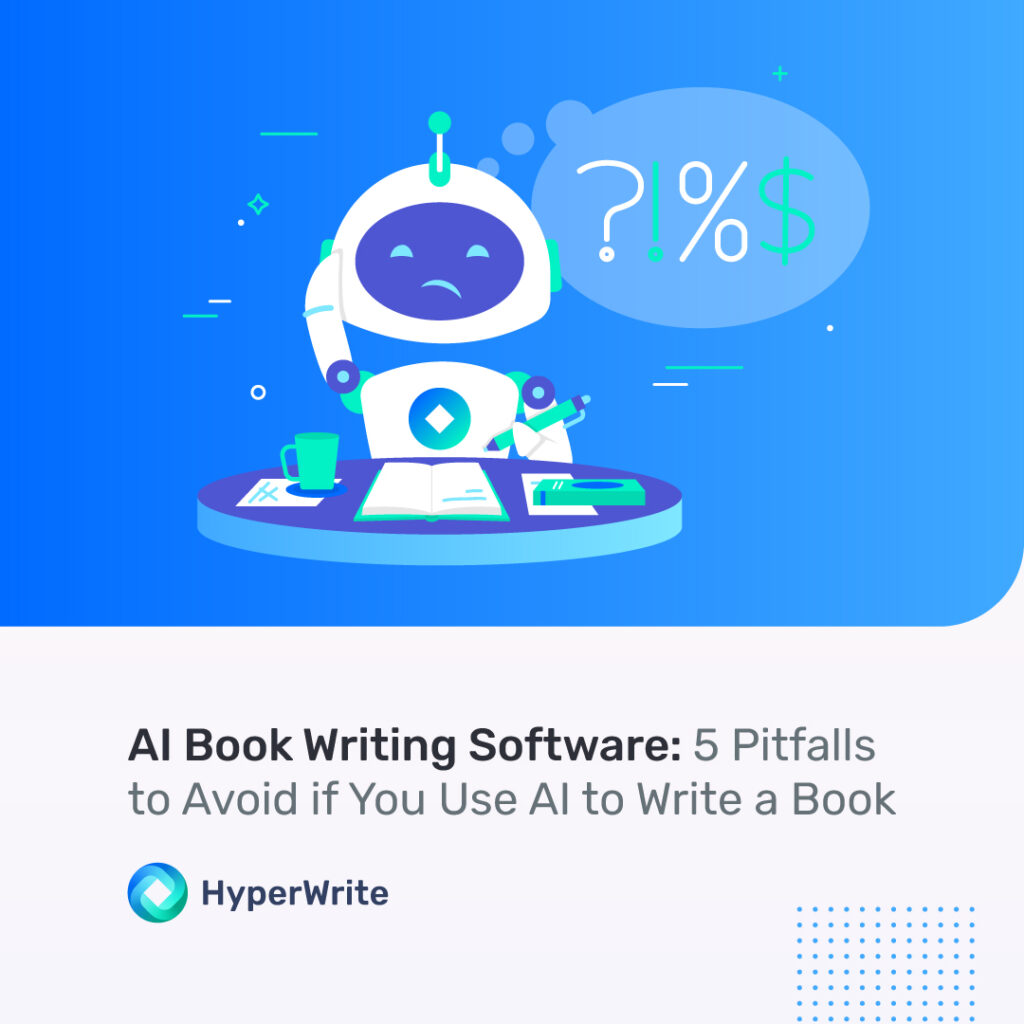
5 Pitfalls of Relying on AI Writing to Write a Book
But first, let’s start with the pitfalls to avoid—so you don’t use AI to write your entire book. Because that wouldn’t be good at all.
The internet is filled with examples of AI writing news articles and books. But is it all authentic or is it sensationalized to fit the “robots taking over the world” scenario?
That’s why we decided to test our AI writing software HyperWrite to see if the hype around AI-assisted writing for books is real.
From our observations, here are five dangers when relying on AI book writing software and how to avoid them so you can still benefit from the many features of AI.
1. Factual Issues
Relying on AI writing software to write and research your book could potentially lead to significant factual errors. This is because AI can’t do extensive research in the same way people perform research.
To understand AI’s limitations, you need to know how it works. AI writing assistant software uses GPT-3. GPT-3 trained on over 570 GB of information. It continues learning patterns of writing and speech to customize its language generations for each author.
But what it can’t do is distinguish between a statistic from 2020 or a statistic from 2021. It may not even know what facts are from articles published in 1999 and what information was published a month ago. These details are crucial when creating books that are updated and relevant today.
Here is an example that our AI software wrote. I gave HyperWrite the question, “Who wrote The Book Thief?”

What is interesting to note is that AI knew the author, where he was from, and even his birth year. But then AI says the author died in 2013 – however, Markus Zusak is very much alive and well today.
AI can give authors a starting point for their research (now I know who wrote The Book Thief). But authors still need to double-check all their information to ensure facts are accurate and updated.
2. Plagiarism Concerns
Plagiarism is NEVER ok, no matter how good of an idea someone else may have. A stolen concept can lead to a ruined reputation, extensive legal repercussions, and losing the rights to your book.
To protect yourself and your work, be VERY careful how you write your book and that you give credit where credit is due.
Here are a few tips to avoid plagiarism.
- Take your time in writing (pressure tempts you to copy work instead of creating unique content).
- Note when ideas are your own and when you are using other people’s thoughts.
- Add citations throughout your content when using other people’s opinions.
- Learn how to paraphrase words and sentences (you will still need to credit the original author).
Since AI writing assistants learned patterns from other authors, you risk plagiarizing those authors’ works whenever you write with the software. Therefore, when using AI software, try to reword the generated content in your own words.
However, if you don’t want to go through the extra step of rewriting everything generated by your AI book writing software, look for a platform that guarantees it creates 100% unique content– like HyperWrite.
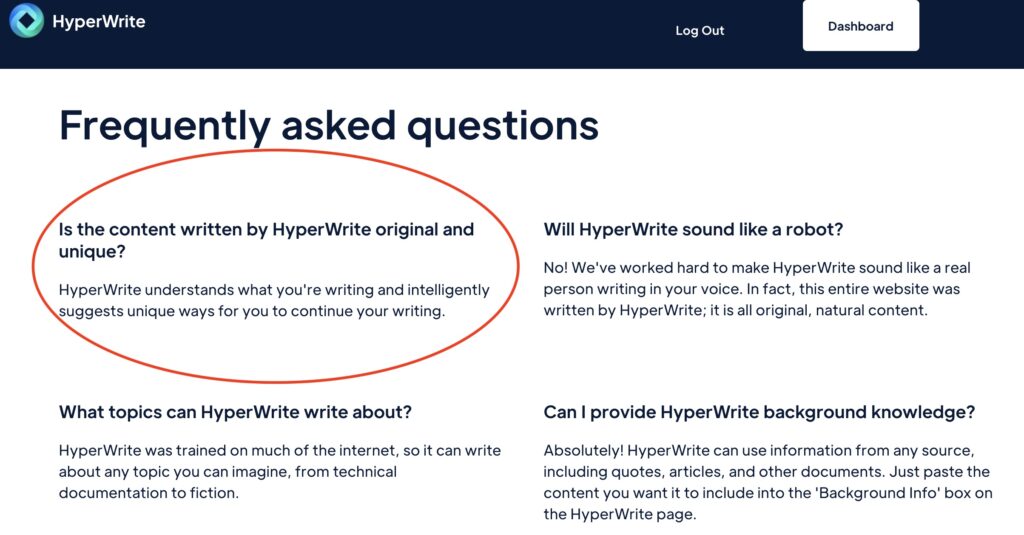
3. Lack of Depth
Malorie Blackman, British author and Children’s Laureate said:
“Reading is an exercise in empathy; an exercise in walking in someone else’s shoes for a while.”
When you write a good book, you’re creating a friend, companion, teacher, or leader for someone else. Your book takes on a life of its own with personality and emotion.
However, when AI writes a book, it can lack depth of information and feeling. So instead, your book is just an algorithm of generated text and copied emotion from the writings AI studied.
The benefit of using AI is the text it generates can trigger an emotional response in you as a writer. Use that emotion to add content with depth of feeling. Also, take the information AI gives you and dig deeper for even more facts or ideas to make your work truly memorable.
4. No Expertise
If you wanted to know your state’s tax laws, which place would have the best answers – a general Google search or searching your state’s government website?
The government website is the most reliable source for that information because it’s specific. Google gives many answers, but you would need to spend extra time weeding out the additional or inaccurate results to find what you need.
Using your AI-powered writing assistant is like a Google search, and your expertise is like one expert website. Use your knowledge to give more depth and accuracy on a topic than AI may pull on its own.
5. Lack of Personal Stories
A book should be personal– even informational books. Every time you write words, you are infusing part of yourself into your work. Unfortunately, AI doesn’t have life experiences to add to its writing, so anything written by AI will lack a personal touch.
If you’re writing an informational book, storytelling helps your audience learn. People fall in one of three categories of learners: visual, auditory, and kinesthetic. Giving information through a story relates to all three learners. Even more, readers are 20 times more likely to remember information in a story.
While AI may give information and facts for your writing, only you can add personal stories and insights that touch people’s hearts and minds in a memorable way.
3 Ways to Use AI Writing to Assist in Book Writing
Now that you know what NOT to do when using AI let’s look at what you CAN do with AI to write better books. For the following examples, we will use HyperWrite to demonstrate how AI helps in the writing process.
1. Brainstorm New Ideas When Faced with Writer’s Block
At the start of this post, we already saw how AI could continue a story from just one sentence. So let’s look at another example of how AI might continue a famous first line.
For this example, we are using the line “Call me Ishmael” from Moby Dick. Before starting on the text, I selected the “fiction” option in the document description. After typing that line in the text body, AI-generated three ideas to continue the story using its text generation feature.
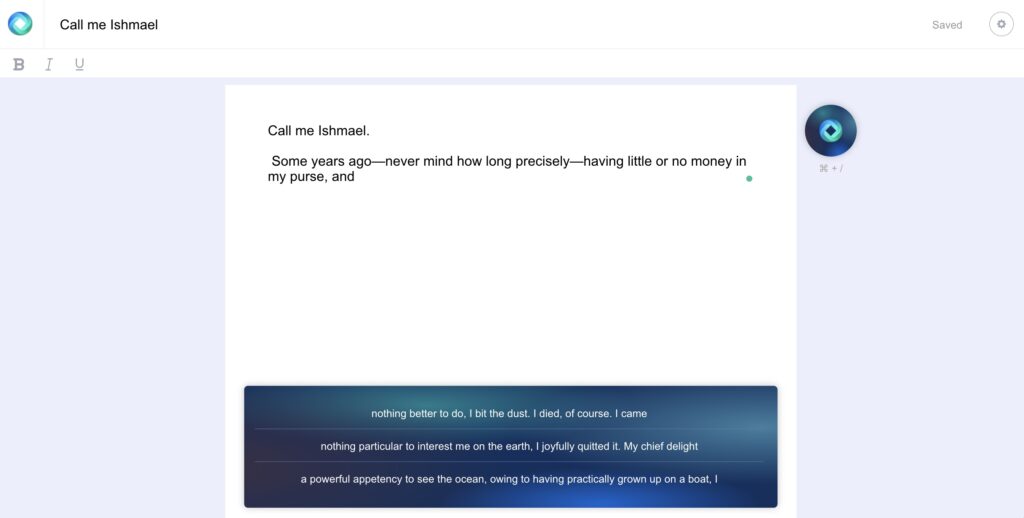
You can use the same process in your book-writing to beat writer’s block and generate new ideas for your book.
2. Generate Chapter Content Ideas and Outlines
For the following example, I used HyperWrite to help flesh out ideas for a book. I began by summarizing The Lord of the Rings into four sections as hypothetical chapters. Next, I entered these four plot sections into HyperWrite’s description and selected the “fiction” option.
I also entered my four-chapter outline in the document and generated text for chapter content ideas under each section.
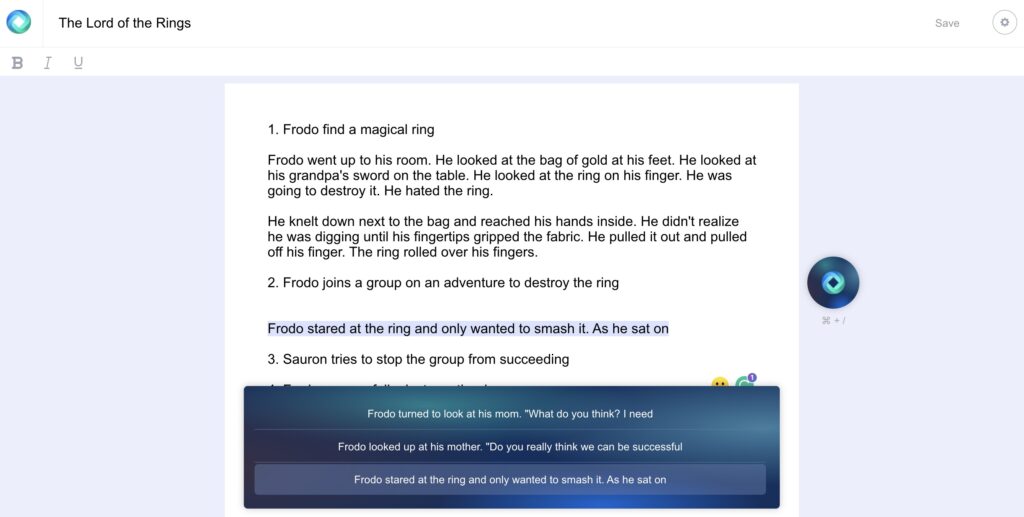
My AI writing assistant online generated original story ideas for each chapter theme that I could expand into complete content sections.
3. Edit Content and Rewrite Sentences
AI has another strength beyond just generating new content. It also rewrites old content.
What we created in the second stage was a potential story outline. You can see several promising starts to chapters. But, the wording doesn’t always flow. For example, the opening of the first section is short and a little dull.
After highlighting that beginning section, I can select how I’d like to reword that section: lengthen it, shorten it, make it more casual, or write it formally. Each option offers three rewrites.
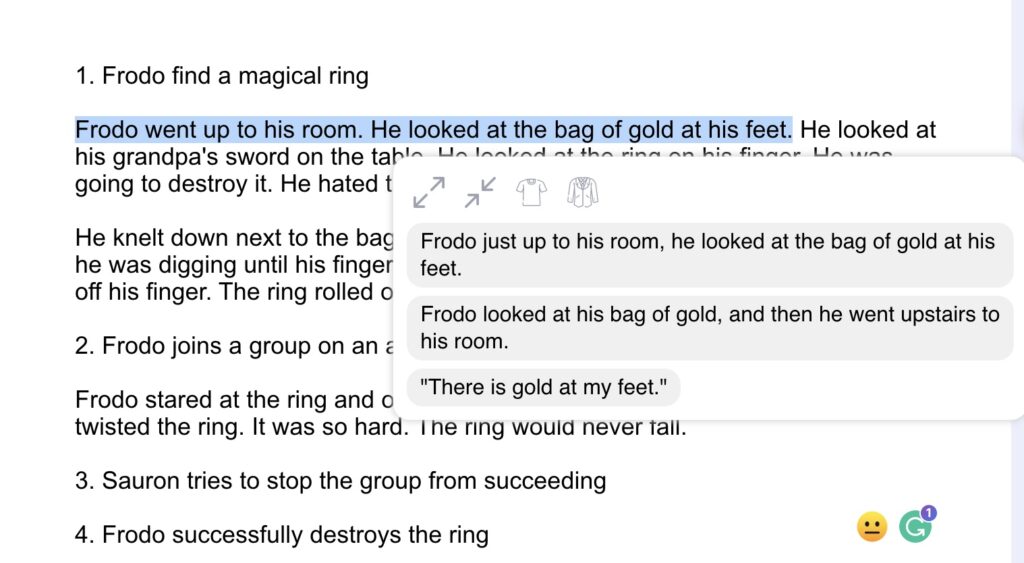
You can also use the Grammarly app in HyperWrite to edit the grammar and flow of your content and make it publish-ready.
Finding the Best Writing Assistant Software
When looking for the best AI book writing software, you’ll want to select an AI creative writing assistant that avoids all these pitfalls while helping you create unique content. Though, not every deep writing AI platform is equal.
We are biased towards our platform because of the excellent content we’ve seen it create. But don’t take our word for it. That’s why we offer a free AI writing assistant option for you to try the platform out for yourself.
If you want an AI writing software online assistant to help you with your next book, sign up for a free account through HyperWrite.


